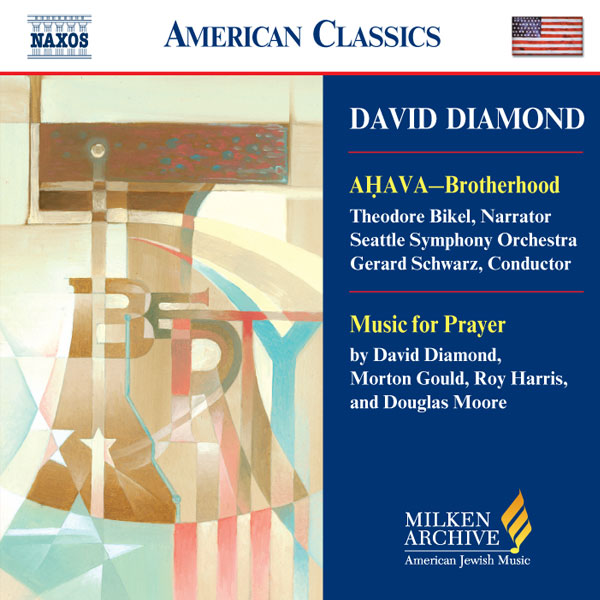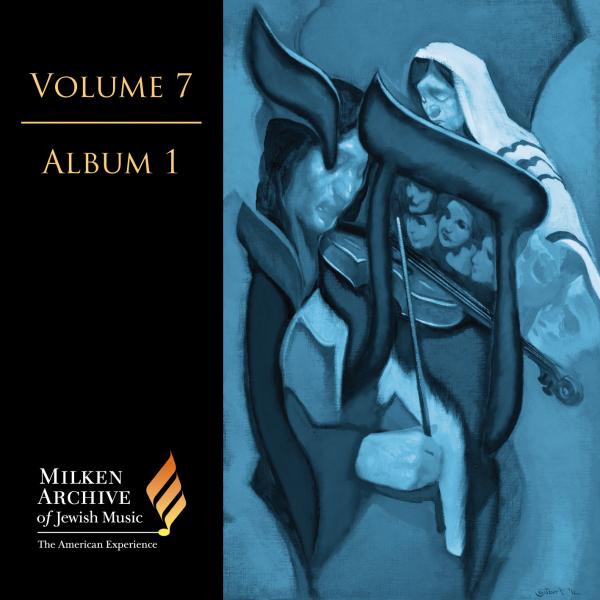Tracks
Liner Notes
In the spring of 1943, Cantor David J. Putterman, who served the pulpit of New York’s Park Avenue Synagogue—a nationally prominent and religiously centrist congregation affiliated with the Conservative movement—presented his first “Sabbath Eve Service of Liturgical Music by Contemporary Composers.” That service offered, as world premieres, the first fruits of his ambitious experiment: the commissioning of well-established as well as promising younger American composers, non-Jews as well as Jews, to write for the American Synagogue and its liturgy. There were some precedents in Europe during the 19th century, notably in Vienna and Paris, for invitations to local Jewish and Christian composers for synagogue settings. Some American synagogues also preceded Putterman in commissioning new music for Jewish worship—in some cases by highly important composers. But Putterman’s project, unlike those occasional or one-time occurrences, was soon designed to function in perpetuity on an annual basis.
Over its decades-long span, Putterman’s Park Avenue Synagogue program sought to encourage serious artists—who were often outside the specifically Jewish liturgical music world—to contribute to Jewish worship, each according to his own stylistic language without imposed conditions. In addition, Putterman’s practical aim was to accumulate an expanding repertoire of sophisticated music suitable for American synagogues, many of whose worshipers were no strangers to contemporary developments in the world of serious cultivated music.
One of the interesting but less commonly realized features of the Putterman commissioning program was its invitation to a number of non-Jewish composers—which had also been the case with the 19th-century Vienna and Paris episodes. Putterman was interested in generating the best possible music for American Jewish worship, whatever the affiliations or faith of the composers, and he appears to have been particularly intrigued by the experimental dimension of Hebrew liturgical expression by some who had little or no exposure to the synagogue—Jews as well as non-Jews in some cases—and who would thereby broaden the field from both artistic and spiritual perspectives. Putterman’s inaugural contemporary music service in 1943 included a newly commissioned Hebrew setting of adonai malakh (Psalm 97) by Alexandre Gretchaninoff (1864–1956), a non-Jewish Moscow-born Russian composer who was an émigré from the Bolshevik Revolution and who, in addition to his reputation for operatic works in particular, had written a good deal of Russian Orthodox Church music. Among other non-Jewish composers commissioned in succeeding years, in addition to Roy Harris and Douglas Moore, were Henry Brant, William Grant Still, and McNeil Robinson.
Both the Park Avenue Synagogue and Putterman took pride in this aspect of the program. The synagogue’s own press release for the 1946 service referred to Putterman’s invitations to composers “regardless of color or creed.” And it went on to explain: “Since music is the universal language of all mankind and ministers to human welfare, Cantor Putterman feels that it can be a most useful medium for better relations between peoples and faiths, because ‘rhythm and harmony find their way into the inward places of the soul.’ ”
In retrospect, once the project beckoned to composers outside the specifically Jewish liturgical realm, there should not have been anything so surprising about that aspect: inviting some composers without regard to religious or even ethnic-cultural affiliation was merely part of the innovation. Although many of the invited Jewish composers from the general music field, such as Diamond, had at least a basic Jewish education, as well as some familiarity with the synagogue and liturgical Hebrew, others had neither—in some cases, not even from childhood. For them, the fresh experience of exploring the Hebrew liturgy for artistic expression could be as much uncharted territory as for non-Jewish composers.
Morton Gould, for example, though Jewish, had no hesitation in informing Putterman that he had no knowledge of Hebrew and could not read it phonetically. Thus he would require transliterations in order to compose his setting for Hamma’ariv aravim, which was commissioned for the 1947 service. Yet his setting provided a delightfully fresh but altogether valid expression of those words in the opening section of the arvit service.
Lyrics
You are worshiped, O Lord (He is worshiped, and His name is worshiped), King of the universe; with Your words You bring on the evening. With Your wisdom You open heaven’s gates, and with Your understanding You make the cycles of time and the seasons alternate; and Your will arranges the stars in their position. Creator of day and night: turning light into darkness, and darkness into light; causing the day to pass and bringing on the night; distinguishing between day and night: Lord of Hosts is His name. May the living and eternal God rule us always, to the end of time! You are worshiped, O Lord (He is worshiped, and His name is worshiped), whose word makes evening fall. Amen.
Credits
Composer: Morton GouldPerformers: Carolina Chamber Chorale; Margery Dodds, Organ; Timothy Koch, Conductor; Richard Troxell, Tenor
Publisher: G&C Music Corp/G. Schirmer, Inc.

